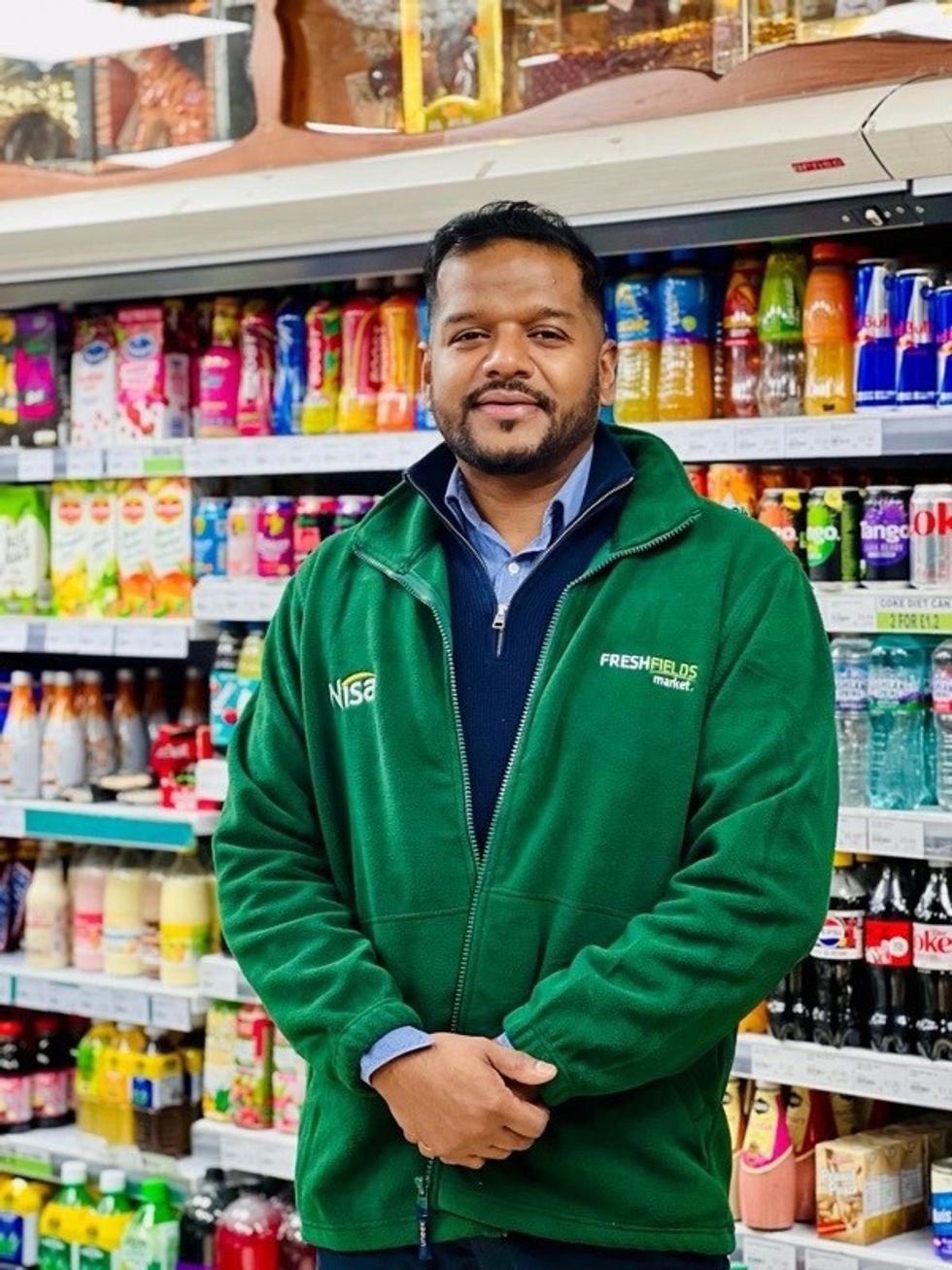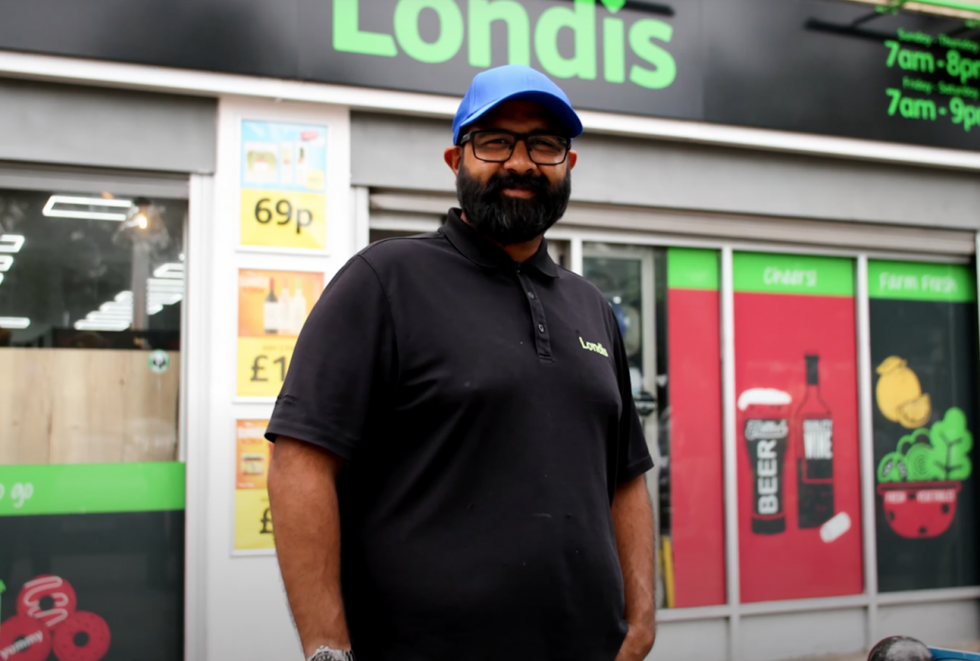As retail crime surges into more violent territory, the UK’s convenience sector is cracking. Yet amid the chaos, hope flickers in grassroots action and in the promise of new legislation, finds Asian Trader.
March saw a series of hard-hitting reports released back-to-back, each painting a grim picture of retail crime across the UK. Whether looking at the convenience sector or the broader retail landscape, the message was chillingly consistent – a disturbing spike in theft, abuse, violence, armed robbery, and hate crime.
Among the worst hit are convenience stores – often small, independently run businesses with minimal security where usual retail staff are told to keep an eye on the shop floor for any suspicious activities.
But seemingly gone are the days of petty theft and sneaky shoplifters. Today, brazen gangs storm in, clear shelves without hesitation, ready to abuse, hit, punch, or spit when confronted.
Take retailer Amit Puntambekar, who runs Ash’s Shop in Cambridgeshire. Earlier this year, he was punched in face by a young woman whom he saw on CCTV footage stealing vapes, leaving him with bloodied nose and lacerations below his eyes.
Operating for the last 40 years, Puntambekar store is the lifeline of Fenstanton village, yet it loses hundreds of pounds’ worth of goods per week to theft.
Taking over from his parents in 2017, Puntambekar had dreams of growing the business further. Today, those dreams hang by a thread.
Amid high levels of crime and “complete apathy” from the authorities, he has often expressed on social media his inclination of "selling the business and leaving retail altogether".
Elsewhere, in Wales, the situation is no better.
Set in a picturesque seaside town, the award-winning Tenby Stores & Post Office boasts some of the most advanced crime prevention measures. Yet, even these tend to fall short when confronted with the worst of human behaviour.
Just last month, store owner and veteran retailer Fiona Malone was spat at by a teenager whom she caught stealing from her shop. Last year in August, her husband Vince Malone was punched by another violent shoplifter on being confronted.
These are not isolated incidents. This seaside town convenience store has been bearing the brunt of the surge in retail crime to record levels, amounting to £20000 to £30000 each year.

Fiona told Asian Trader, “Overall, society needs to acknowledge that shop crime isn’t victimless and that it is wrong.
“People think it’s ok, the shops can afford it; which we can’t, and ultimately it could put us out of business.”
When convenience stores like these pushed too far, where the retailers start to question their very existence, it should ring alarm bells for the community they serve.
Fiona's store also has a Post Office offering banking services, the only one in the town. If it closes, residents will have to face a “three-hour round trip to access cash”.
“We employ 16 members of staff on permanent contracts so again this would be devastating for the town if we were to close,” she said.
These attacks don’t stop at the shop door; they leave emotional scars on the entire families.
“No one thinks of the knock-on consequences. With the government piling on costs, this could cause many small businesses to close,” she added.
Organised Gangs
According to the latest ACS Crime Report, more than half of convenience retailers have seen a rise in anti-social behaviour near their stores. And it’s not just rowdy teens or opportunistic thieves but highly organised gangs at play, too.
In Oxfordshire, SPAR Minster Lovell, run by retailer Ian Lewis, has been serving shoppers since 1937. Yet that does not make it immune to crime.
The store was targeted in September last year though the men could not break in.
However, it did not have the same luck on Boxing Day. During the early hours of December 27, a gang struck again. This time not only did they break into, but they attached the store’s cash machine (which was at the rear) with a Land Rover and tore it apart, dragging it all the way out, damaging the chiller on the way.
Apart from taking the cash machine that had about £2,500 inside, the criminals left behind a badly damaged store, £1,000 worth of spoilt stock, a ruined front door and a badly shaken family sleeping upstairs when the ram-raid occurred.
These are simply some examples of crime levels that retailers are dealing with. Clearly, crime has not only increased but criminals are now also more violent, fearless and organised.
Retailer Benedict Selvaratnam operates Nisa Local Freshfields Market store in Croydon, South London, the region that has been rated as one of the most notorious crime-spots in multiple industry reports.

He shared with Asian Trader, “Over the past year, retail crime has not only increased, it’s become bolder.
“Offenders are more aggressive, less worried about getting caught, and in some cases, outright confrontational.
"For us and many other independent shopkeepers, it’s incredibly frustrating. The financial losses are one thing, but the emotional impact on our staff is even worse.
"They’re on the front line, trying to serve the community and ending up feeling unsafe. And honestly, most of the time when we report these incidents, there’s little or no follow-up. That makes us feel like we’re on our own.
“We had a situation recently where a staff member, a young woman, was verbally abused and threatened by a known shoplifter.
“She was simply doing her job. We reported right away, but no one came. That’s not acceptable.”
Crime and Policing Bill
The Crime and Policing Bill, currently under debate in the House of Lords, promises to deliver long-awaited protection for retail workers.
Among its key proposals is the introduction of a new criminal offence for assaulting a retail worker, a long-standing demand from the sector.
Another significant provision is the repeal of Section 176 of the Anti-social Behaviour, Crime and Policing Act 2014, the clause that effectively downgraded police response to so-called “low-value shop theft” that is under £200 value.
Additional measures in the bill include Respect Orders to ban repeat offenders from town centres and the recruitment of 13,000 new neighbourhood police officers.
On paper, it’s a promising step in the right direction. But for many retailers, the question remains-how much things will actually change on the ground?
Selvaratnam said, “We’re hopeful, but cautious. But it all comes down to how it’s enforced.
“If it means that repeat offenders are dealt with properly, and there’s real backing for independent retailers, then great. But if it ends up being just more paperwork or something only big chains benefit from, then nothing will change.”
In Dartford, retailer Nishi Patel, owner of Londis Bexley Park, is pinning hopes that the changes in the law, once they come into effect, will finally bring some fear among offenders.

He is particularly relieved that the Labour government is removing the £200 threshold introduced by the Tory government.
Patel shared with Asian Trader, "Businesses like ours are never going to have £200 worth of stuff stolen. It's going to be £10 or £15, but if you add that up that over a week, it's going to get to that level which eventually becomes a huge drain on the stores.
“This threshold has been a massive detriment for our business over a long period of time. So, getting rid of £200 should be the right step in convicting prolific shoplifters.”
Patel wants the repercussion on the offenders to be more consequential and visible.
He added, “We need to see more criminals and miscreants getting punished harsher sentences.
“We are small business owners; we have families to support. With rates and operational costs going up, the last thing we need is someone coming into our business and stealing.
“I think the government needs to understand that we are the backbone of Britain's small businesses, majority of which are struggling because of a few rampant criminals."
Selvaratnam is calling on for added measures like letting small retailers access info on known repeat offenders, quick and easy ways to report crime with actual follow-up, financial help for independents to install better security systems and more focus on staff wellbeing as dealing with crime is stressful.
"And seriously, shoplifting shouldn’t be judged by how much the thief took. Whether it’s £10 or £100, the impact is the same," he added.
Urging the authorities to not to overlook independent shops, he added, "We’re a big part of the local economy and community. We care about our customers and our teams, but we need proper support."
Best foot forward
While the wheels of government tend to turn slowly, if at all, many retailers are taking matters into their own hands.
From AI-powered CCTV to smarter store layouts, staff training and visible signage, shop owners are embracing various solutions to prevent crime.
Retailer WhatsApp groups are fast emerging as another line of defence. Both Selvaratnam and Patel are part of growing local networks that share real-time intel on offenders, allowing retailers in the area to stay alert and act fast.
Selvaratnam is also a member of Croydon BID and have signed up to their Radio network.
Patel explained, "We share intel on offenders so it gets everyone in the area alert on what's happening, who is coming down the street and who not to let in.”
Although retailers are doing their best to save stock as well as to safeguard their staff, it is only police visibility and real consequences that are going to have an impact.
In the words of Selvaratnam, no matter what tech or training is put in place, nothing beats visible police presence and proper consequences for offenders.
Both Patel and Selvaratnam echo the wider sentiment for more active involvement by the authorities.
“Rather than approaching us only for CCTV copies, police should also ask us about our concerns. MPs too need to be more involved with us,” Patel pointed out.
What the convenience sector truly needs isn’t sympathy, its swift justice, serious deterrents, and an active police presence.
Because every day without real action risks another store lost, another community shaken, another retailer pushed too far.






